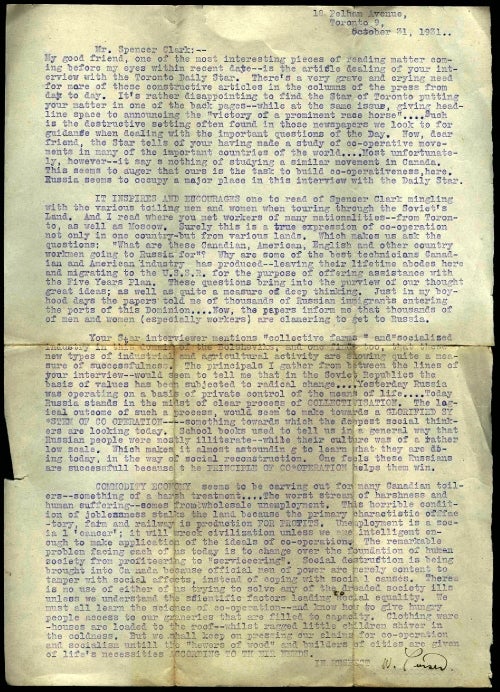Dana Porter Library, first floor
University of Waterloo Library
Waterloo, Ontario N2L 3G1
519-888-4567 x42619 or x42445
<< Correspondence
<< 2nd Letter Sent
Transcript
18 Pelham Avenue, Toronto 9, October 31, 1931..
Mr. Spencer Clark:--
My good friend, one of the most interesting pieces of reading matter coming before my eyes within recent date—is the article dealing of your interview with the Toronto Daily Star. There’s a very grave and crying need for more of these constructive articles in the columns of the press from day to day. It’s rather disappointing to find the Star of Toronto putting your matter in one of the back pages—while at the same issue, giving headline space to announcing the “victory of a prominent race horse”....Such guidance when dealing with the important questions of the Day. Now, dear friend, the Star tells of your having made a study of co-operative movements in many of the important countries of the world....Most unfortunately, however—it says nothing of studying a similar movement in Canada. This seems to auger that ours is the task to build co-operativeness, here. Russia seems to occupy a major place in this interview with the Daily Star.
IT INSPIRES AND ENCOURAGES one to read of Spencer Clark mingling with the various toiling men and women when touring through the Soviet’s Land. And I read where you met workers of many nationalities—from Toronto, as well as Moscow. Surely this is a true expression of co-operation not only in one country-but from various lands. Which makes us ask the questions: “What are these Canadian, American, English and other country workmen going to Russia for”? Why are some of the best technicians Canadian and American industry has produced—leaving their lifetime abodes here and migrating to the U.S.S.R. for the purpose of offering assistance with the Five Years Plan. These questions bring into the purview of our thought great ideas; as well as quite a measure of deep thinking. Just in my boyhood days the papers told me of thousands of Russian immigrants entering the ports of this Dominion...Now, the papers inform me that thousands of men and women (especially workers) are clamering [i.e. clamouring] to get to Russia.
Your Star interviewer mentions “collective farms” and “socialized industry in this domain of the Bolsheviks, and one finds too, that these new types of industrial and agricultural activity are showing quite a measure of successfulness. The principals [i.e. principles] I gather from between the lines of your interview—would seem to tell me that in the Soviet Republics the basis of values has been subjected to radical change....Yesterday Russia was operating on a basis of private control of the means of life....Today Russia stands in the midst of clear process of COLLECTIVISATION. The lagical [i.e. logical] outcome of such a process, would seem to make towards a GLORIFIED SY*STEM [i.e. SYSTEM] OF CO OPERATION----something towards which the deepest social thinkers are looking today. School books used to tell us in a general way that Russian people were mostly illiterate—while their culture was of a rather low scale. Which makes it almost astounding to learn what they are doing today, in the way of social reconstruction. One feels these Russians are successfull [i.e. successful] because the PRINCIPLE OF CO*OPERATION [i.e. COOPERATION] helps them win.
COMMODITY ECONOMY seems to be carving out for many Canadian toilers—something of a harsh treatment...The worst stream of harshness and human suffering—comes from wholesale unemployment. This horrible condition of joblessness stalks the land because the primary characteristic offfactory [i.e. of factory], farm and railway is production FOR PROFITS. Unemployment is a social ‘cancer’; it will wreck civilization unless we are intelligent enough to make application of the ideals of co-operation. The remarkable problem facing each of us today is to change over the foundation of human society from profiteering to “serviceering”. Social destruction is being brought into Canada because official men of power are merely content to tamper with social affects, instead of coping with social causes. Theres [i.e., there] is no use of either of us trying to solve any of the dreaded society ills unless we understand the scientific factors leading to social equality. We must all learn the science of co-operation—and know how to give hungry people access to our graneries [i.e. granaries] that are filled to capacity. Clothing warehouses are loaded to the roof-whilst ragged little children shiver in the coldness. But we shall keep on pressing our claims for co-operation and socialism untill [i.e. until] the “hewers of wood” and builders of cities are given of life’s necessities ACCORDING TO THEIR NEEDS.
IN RESPECT W. Purser
<< 2nd Letter Sent
<< Correspondence





